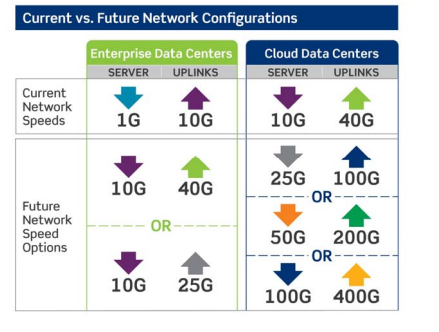Data centers driving 40G optical transceivers
40G QSFP+ transceivers, the data center likely will be the engine of any overall growth in optical transceiver sales over the next several years. Data centers now represent 65% of the overall telecom and datacom market for 10G/40G/100G optical transceivers. 40G switches allow the configuration of 40G port to act as one port or break out into four individual ports. To get easy 10G/40G migration, we should better select 40G QSFP+ transceivers which can break out as 4x10G connectivity. Among so many versions of 40G QSFP+ transceivers including QSFP 40G SR4, QSFP 40 CSR4, QSFP 40G LR4, QSFP 40G ER4, etc., which 40G QSFP+ transceiver can be used for 4x10G ?

40G short distance multimode transceivers are interfaced with 12 fiber MTP/MPO, such as 40G SR4, CSR4. To know why these 40G QSFP+ modules can be used for 4x10G, let’s see how QSFP 40G SR4 work? First, 4 electrical input signals of 10G converted into parallel optical signals are sent from the transmitter over 4 parallel fiber strands. Then the parallel optical signals are converted into parallel electrical signals by the use of a photo detector array and transmitted to the receiver over another 4 parallel fiber strands. QSFP 40G SR4 needs 8 fibers to transmit and receive signals. QSFP 40G SR4 transceivers are interfaced with 12 fiber MTP/MPO. Therefore, QSFP 40G SR4 and QSFP 40G CSR4 transceivers can be easily broken down to 4x10G connections. Each 10G signal lane of QSFP 40G SR4 is compliant to IEEE 10GBASE SR specifications. And this 10G/40G connection can be achieved by using an MTP LC harness cable or MTP cable and MTP LC breakout patch panel to connect the QSFP 40G SR4 and four 10GBASE SR modules.
QSFP 40G LR4 transceivers apply CWDM (Coarse Wavelength Division Multiplexing) technology. From the transmitter side, 4 input electrical signals of 10G are converted into 4 CWDM optical signals by a driven 4 wavelength distributed feedback (DFB) laser array. Then 4 CWDM signals are multiplexed to a singlemode fiber for 40G optical signal transmission. On the receiver side, the receiver accepts 40G CWDM optical signals input and demultiplexes them into 4 individual 10G optical data streams with different wavelengths. Multiplexing and demultiplexing of the four wavelengths are managed in the device. The 40 Gigabit Ethernet signal is carried over four wavelengths on a pair of singlemode fibers. The duplex fibers are used for bi directional transmission. QSFP 40G LR4 and QSFP 40G ER4 are interfaced with duplex LC connector. Therefore, we can’t split QSFP 40G LR4 or QSFP 40G ER4 to 4 individual duplex SMF fibers to route them to 4 separate 10G transceivers by simple optical rerouting.
But if you insist to split the 40G into four 10G streams using QSFP 40G LR4 or QSFP 40G ER4 modules, how to achieve that connection? Then you need a simple multiplexer/demultiplexer which split the four wavelengths on duplex fibers into 4x10G signal in four different fibers. With such equipment, the QSFP 40G LR4 or QSFP 40G ER4 outputs can be physically broken down from one duplex fiber into four duplex fibers so that each of the wavelengths is transmitted in four different fibers (As the following figure shows).
From the above content, you may get an inclusion that multimode 40G QSFP+ transceivers can be directly used as 4x10G while singlemode 40G QSFP+ transceivers can’t. However, you ignore one singlemode transceiver QSFP 40G PLRL4. This 40G QSFP+ transceiver connects with 12 fiber MTP/MPO patch cable though it’s designed for long distance transmission. Similar to QSFP 40G SR4, QSFP 40G PLRL4 also needs 8 fibers to transmit and receive signals. So you can easily get 10G/40G singlemode connection applying QSFP 40G PLRL4.
Some data centers may face the issue of migration from 10G to 40G. Except the switch, you also need to know 40G QSFP+ transceivers well especially what kind of 40G QSFP+ transceivers can be used for 4x10G connectivity. In this article, you can see 40G QSFP+ transceivers with MTP/MPO interface can achieve that connection by simple optical routing. As to 40G QSFP+ transceivers with duplex LC interface, you need spare equipment for multiplexing/demultiplexing. For 40G to 4x10G solutions, you can find your desired one from Fiberinthebox.COM.












